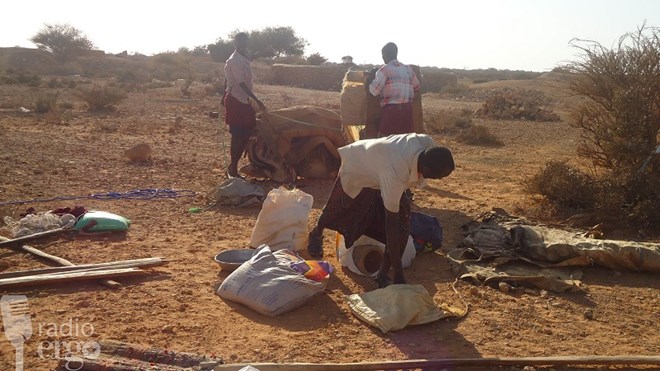
Abdi Aden, a herder in Halwa village in north-eastern Somalia’s Bari region, is feeding his 20 remaining sheep, 35 goats and nine camels on cardboard soaked with water.
There is no pasture in the area, after two virtually dry years. The anticipated ‘deyr’ rains have yet to arrive here this season.
Abdi used to have a herd of 482 animals. There is nothing now for his family to survive on so he has sent his wife and seven children to stay with relatives in Rako Raho, a town seven kilometres away. Most people in Halwa have already left.
Large numbers of pastoralists, stricken by the drought in this part of Puntland, have been arriving in and around Rako Raho in recent weeks.
Hawa Saed, 50, and five of her children came to Rako Raho two weeks ago. Her husband and one son stayed behind in Adduro village, 60 km away, with the 40 goats they have left. The family has lost 220 goats and 34 camels since January.
Hawa and the children pitched their ‘aqal’ [traditional nomadic collapsible hut made from poles covered by hides and mats] on open ground outside town. They are dependent on whatever food their relatives in the area can afford to share with them.
“This drought is the worst we’ve know, the ‘deyr’ rain seems to have failed so there was no reason for us to stay any longer in the remote rural areas,” Hawa said.
She added that they get occasional cooked meals from their relatives.
An estimated 360 families fleeing drought have arrived in Rako Raho town and 13 nearby villages since October.
Maymun Abdullahi Yusuf, secretary of Rako Raho local authority, told Radio Ergo there were many other desperate pastoralists in the district who were on the move.
“Every day 10 new families arrive in Rako Raho town and other villages. When we see a vehicle coming, we obviously know it is carrying people fleeing from the drought. We feel sad about it,” he said.
Rako Raho and nearby villages are in Kodmo valley, previously known for its pasture. But as rain has not come to the district there is no grass and little food. However, people and their livestock are still able to get water pumped from the wells.
The director of Puntand’s Disaster Management Agency, Abdullahi Abdirahman, speaking to Radio Ergo by phone, said 260,000 pastoralists were severely affected by the drought in Puntland. The agency conducted an assessment and found that affected herders are managing to eat once every 24 hours.
He said the next five months would see the situation becoming dire if the rains failed.